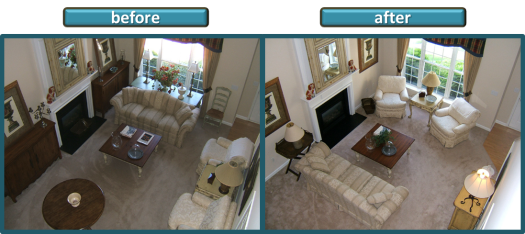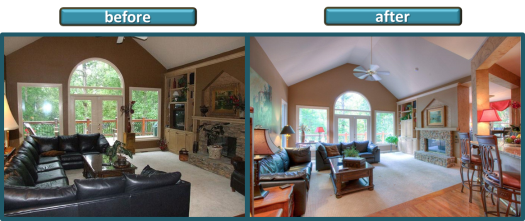This great article came to me in a newsletter  from Mary Thompson, Certified Appraiser, with Lanier Appraisal Service. I wanted to share this with you, as a low appraisal can often be a deal breaker, not to mention a huge source of stress for the seller. An experienced Realtor will be able to advise if you are listing your home too high for the market, or be ready to go to bat for you if the appraisal appears to be erroneous.
from Mary Thompson, Certified Appraiser, with Lanier Appraisal Service. I wanted to share this with you, as a low appraisal can often be a deal breaker, not to mention a huge source of stress for the seller. An experienced Realtor will be able to advise if you are listing your home too high for the market, or be ready to go to bat for you if the appraisal appears to be erroneous.
Having the right team on your side will help you get your home sold faster, and at the best market-price possible.
Marie Dinsmore, Certified Luxury Home Marketing Specialist
The Dinsmore Real Estate Team | www.dinsmoreteam.com
Marie@DinsmoreTeam.com | 770-712-7789
***
Article courtesy of Mary Thompson with Lanier Appraisal Service. Please see their website for additional information: www.lanierappraisalservice.com
You get the BAD news….The Appraisal came in Below Contract Price. What do you do as an Agent now? This one is long, but well worth the READ to help your sellers out of a difficult situation. Print it off to Read Later Or Save in a Special File in your Email Program for later reference.
1. First Please Ask Yourself…Did your GUT tell you value might be a problem? If so, you really need to re-negotiate that contract and make it work, because this is the sellers only option as another appraisal will not fix the problem.
2. If indeed you feel appraised value is low based upon your own market analysis or A Pre-Listing Appraisal provided to the Bank’s Appraiser, then review the comps used by the Bank’s Appraiser to see if they used ANY of the comps You provided or the Pre-Listing Report included. If not…Why not? The Appraiser needs to answer that question for you. (See “Benefits of getting a Pre-Listing Appraisal” Link to your Left as well as “Letter to The Seller” which you can give to them during your Listing Appointments. This could save You and the Seller very real head aches at contract time!)
3. Closely Check The First page of the Report which has all the Data on the home. If there are many errors on this page, such as wrong legal description, address (yes, I have seen wrong addresses on reports), type of exterior building materials on the home, Roof material, Windows, Number of Garages, number of bedrooms and baths (remember appraisers separate beds and bath in the terrace level from the GLA or gross living area which is above grade/ground), neighborhood description and boundaries, interior amenities, there is a GOOD chance the other parts of the report are not reliable, such as the comps used and the adjustments made for the comps.
** Check the Comparable Sales Page. If you see adjustment amounts that are too low or too high, ask why and how they came up with that number? ** IF YOU ARE DEALING WITH LAKE PROPERTY and See NO adjustments under the Lake Site for the Comps, this is a Red Flag. As you know Lake Lot values vary widely and just because each comp is located on the lake, does not mean the sites are equal in value across the board. In most cases an adjustment is warranted on the lake. This applies to all specialty properties like Golf Course and Mountain View homes, etc.
*** Check the ADJUSTMENTS very closely as to the POSITIVE + or NEGATIVE – adjustments made to the comps. An Error here can mean thousands more for the subject property. If the COMP is superior to the subject a NEGATIVE adjustment (against that sales price) should be made to that Comp. If the COMP is inferior to the Subject a POSITIVE adjustment should be made. Their comments should clearly show which are positive and which are negative and some are obvious, such as more or less beds, baths and square footage compared to the Subject.
4. Check the Sketch for errors! This is one area overlooked by most and it could change the value by Thousands in the Sellers favor. If the Appraiser has UNDER Sized the home and the dimensions are not accurate, even if it is only by 100 square feet that could translate into Two, Three, Four Thousand Dollars depending upon the price per square foot used in the report.
(I have found several errors in other appraisers sketches so do not miss out on this opportunity). You can take that sketch and remeasure the exterior walls and see if it jives with the Appraiser’s Sketch) We do offer Sketch service so if you need help just give me a call. The cost will be well worth the ADDED benefit if the original sketch is not correct.
5. Ask the question….What expertise does this appraiser have in this area? For Example with Lake property, how many appraisals has this Appraiser completed on the Lake in the past 6 months? City Appraisals….How many appraisals has the Appraiser completed in your given City ie; Gainesville. Values can vary widely within blocks of each other.
*** IT IS REQUIRED BY USPAP (Uniform Standards of Professional Appraisal Practice) that the Appraiser MUST be competent in the area in which they appraise or they MUST reject the assignment! It is called the Competency Rule. So unless they seek the advice of a local expert and NAME them in the report, they should not be accepting assignments in areas that they do not know or they violate USPAP. FANNIE MAE is very specific about this requirement being met by both Lenders who assign the orders and Appraisers who accept them!
6. Put together a clear and concise rebuttal letter for the buyers lender. You need to include 2-3 comps that were not included in the report which you feel should have been included and WHY. You also need to state why any or all of the comps that the appraiser used were NOT the most comparable or why the adjustments or lack thereof are a problem.
7. Beware of the Comps You Provide in a Rebuttal. Realtors tend to use Comps that are Sales Price driven. I have seen many cases where the comps actually made the value lower as they were larger or newer homes or located in superior developments, etc. So please be careful to check these comps closely before you include them in your rebuttal. You do not want them to backfire on you.
8. If you have first hand knowledge about some of the COMPS used by the Appraiser and they are not describing them accurately in the report ie; you know that the interior was in bad shape (even if the FMLS photos showed otherwise). You know it was a distress situation, divorce, etc. that the Appraiser would have no way of knowing about. Anything about those homes, recent upgrades, amenities, that you know exists and the appraiser would have no way of knowing about, should be pointed out in your rebuttal.
9. Check the Comparable PHOTOS used by the Appraiser in their report. If any or all appear to have been taken right off the MLS/FMLS listings, CRY FOUL in your Rebuttal! Some are quite easy to detect as the Comp Photos are Spring Time Shots when the appraisal was done in the winter, etc. Appraisers are supposed to drive by the Comps and take their own photos for most every Lending Transaction, unless the home sits way back off the road or is gated, etc. If you see that they are using only FMLS/MLS photos, this likely means they never drove by the home and this is critical in order to get a feel for the neighborhood as well as how the home looks and compares to the subject.
**In your rebuttal state that some or all of the photos were taken from FMLS/MLS Listings and you are very concerned that the Appraiser never drove by them, otherwise their own photos would be used in the report. Appraiser will have to answer to this.
10. Consider an Independent Rebuttal Appraisal to provide to the Lender and Bank Appraiser. This will certainly confirm or deny the LOW Appraisal. If it does confirm a low appraised value, it can go a long way to get the Bank’s appraised value up. Even if it is just a few thousand dollars, it is worth the cost of the Appraisal.
This entire process does take time, but if done properly, it CAN and HAS been successful. I suggest bringing your Seller heavily into the process. They can consider it a Challenge to work on. The owner knows their home better than anyone and they can comb through the report for errors which can be included in your rebuttal and which will force the Bank and Appraiser to take a second look at the Report. Sellers can drive by the comps and tell you how they compare in neighborhood location, appeal, etc.
I hope this helps you to bring about a successful conclusion to your Rebuttal. Just come right out and ask the Appraiser & Bank to reconsider the facts put forth in your rebuttal. You can ask for reconsideration or for another appraisal if you feel you are not getting a positive response from the Lender and the Lender’s Appraiser. They cannot just ignore your request for Review.



 at midnight, researchers at the University of Chicago concluded that living within a mile of a Walmart store could raise your home’s value by 1%-2%, and living within half a mile could boost your property value by an additional 1%. For an average-size home, that’s an uptick of $4,000-$7,000.
at midnight, researchers at the University of Chicago concluded that living within a mile of a Walmart store could raise your home’s value by 1%-2%, and living within half a mile could boost your property value by an additional 1%. For an average-size home, that’s an uptick of $4,000-$7,000.




